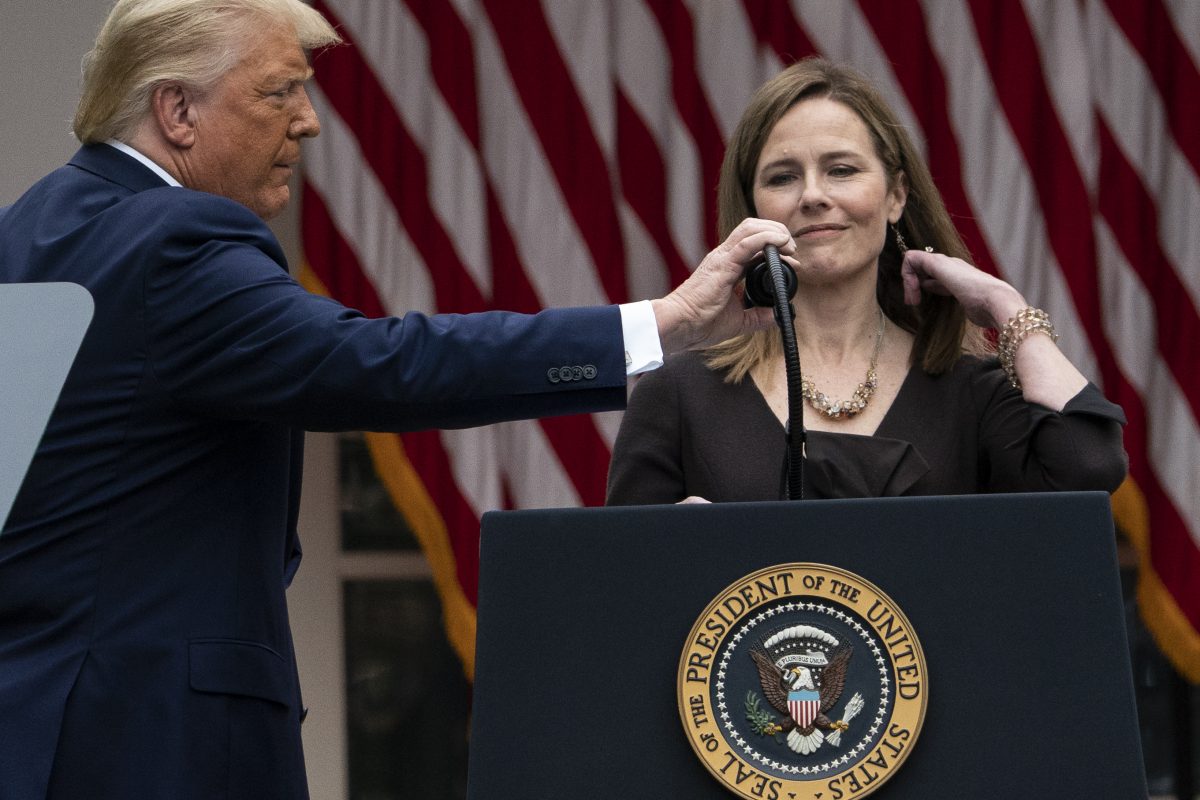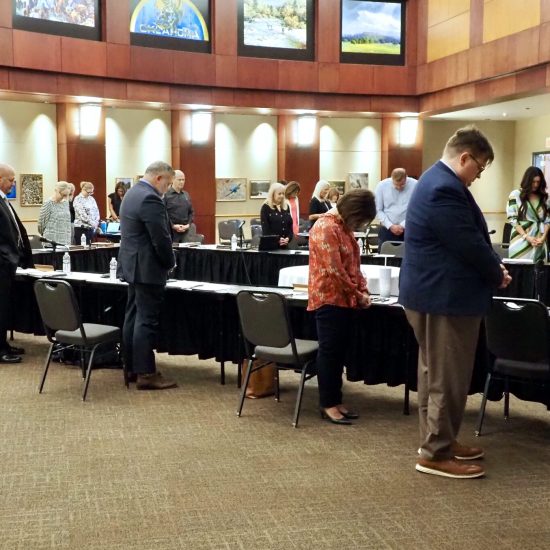
With the U.S. Senate’s Judiciary Committee starting its hearing Monday (Oct. 12) to consider the nomination of Amy Coney Barrett as a justice for the U.S. Supreme Court, a Baptist group that closely watches church-state cases sent a letter to the senators on the committee. The letter from BJC (also known as Baptist Joint Committee for Religious Liberty) includes analysis of Barrett’s record on religious liberty issues.
Signed by BJC Executive Director Amanda Tyler, General Counsel Holly Hollman, and Associate General Counsel Jennifer Hawks, the Oct. 12 letter expresses concerns about Barrett’s judicial record and philosophy. The letter notes that “while BJC does not support or oppose particular nominations, we review a nominee’s church-state records in context of current standards and trends in the law and public debates.”

President Donald Trump adjusts the microphone after he announced Judge Amy Coney Barrett as his nominee to the Supreme Court, in the Rose Garden at the White House, on Sept. 26, 2020. (Alex Brandon/Associated Press)
Given media attention to Barrett’s personal faith — and comments by some Democratic senators during her previous judicial confirmation in 2017 questioning if she was too religiously dogmatic to serve as a judge — BJC highlighted in their letter that the only religious reference in the U.S. Constitution before amendments was a prohibition on religious tests for office. Thus, BJC urged against a focus on Barrett’s personal faith.
“The role of a justice should not involve making religious decisions,” BJC explained. “Speculation about the influence of a justice’s religion on his or her decisions is rarely helpful.”
BJC’s letter also notes the current nomination comes “at a time of a major shift in church-state law” as the Supreme Court in recent years “decided a number of cases that show an increasing deference to religious claimants without a concurrent concern for protecting other important government interests, such as keeping the government from advancing religion.” Justices will in November hear oral arguments in another case where such tension could be found — Fulton v. Philadelphia, in which BJC filed a friend-of-the-court brief.
This shift in religious liberty rulings could be amplified given, as BJC noted, “the sharp distinctions between Judge Barrett and Justice Ginsburg.”
Analysis of Barrett’s Record
BJC’s letter urges senators to question Barrett on religious liberty issues since “her record as a judge in church-state matters is slim.” The end of the letter even includes some recommended questions.
BJC found that only nine of the about 600 cases Barrett had been involved in as a judge since 2017 involved issues related to religion or religious liberty. But she wrote no decisions, concurrence, or dissents in those nine cases.
Seven of the cases, BJC concluded, “resulted in unsigned, unanimous, unremarkable orders from the 3-judge panel of which Barrett was a member.” Thus, BJC added, “they provide little to no insight into how she might approach difficult religious liberty controversies if confirmed.”
That leaves just two cases BJC found “relevant to current church-state disputes and recent developments.”
One case, Illinois Republican Party, et al. v. Pritzker, involved a dispute about coronavirus restrictions and religious gatherings. BJC noted that in similar cases across the country this year, “generally, courts have affirmed the right of officials to limit indoor worship to protect public health and safety to the same extent and under the same regulations that similar secular activities are restricted.” Yet, Barrett joined a decision arguing the governor could “carve out some room for religion, even while he declined to do so for other activities.” BJC disagreed.
“The decision was issued at an early stage in the litigation, without the full benefit of a hearing on the merits. Nonetheless, it is troubling,” BJC wrote. “It privileges religious speech at odds with Supreme Court cases that hold that religious speech must be treated equally with comparable nonreligious speech.”
In another case, Grussgott v. Milwaukee Jewish Day School, Barrett in 2018 joined a decision that BJC said “took a deferential stance toward religious institutions in hiring.” The ruling said a teacher couldn’t sue for wrongful termination under the Americans with Disabilities Act because the religious school is exempt by considering the teacher a minister. BJC noted that the Supreme Court had since similarly moved in that direction with the “ministerial exception,” but the opinion Barrett joined “suggested an even broader bases for religious institutions to avoid the application of employee protections.”
BJC also pointed to Barrett’s comments claiming she would try to emulate her mentor, the late Justice Antonin Scalia. Given Scalia’s troubling record on church-state matters, Barrett’s praise of him raises concerns.
“Justice Scalia’s decisions reject the kind of government neutrality BJC believes the Establishment Clause demands,” BJC wrote. “Despite the plain text of the First Amendment and a historical record that indicates otherwise, Justice Scalia maintained that the First Amendment allows government to favor religion over irreligion so long as it doesn’t explicitly prefer one religion over another. Justice Scalia supported government-supported religious displays and official prayers at local government meetings. Justice Ginsburg, whose seat Judge Barrett would fill, did not.”
“If Judge Barrett interprets the Religion Clauses like her mentor did, her elevation to the Court is likely to further the Court’s trend of giving short shrift to the Establishment Clause and altering the balance provided in the Religion Clauses that was a keen concern of Justice Ginsburg,” BJC added.
While not offering an endorsement or rejection of Barrett’s nomination, BJC offered a concluding assessment to urge the senators to “vigorously question her about her judicial philosophy and her approach to the Constitution’s guarantee of religious liberty for all.”
“While Judge Amy Coney Barrett has the kind of education and professional credentials that would qualify her for service on the Court, her practical and judicial experience is limited,” BJC wrote. “Based upon our review of her record, it seems likely that her appointment would further threaten the Establishment Clause and the crucial role it plays in ensuring faith freedom for all.”






